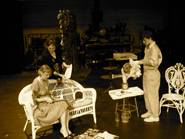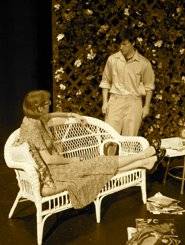 One of the most influential and prolific playwrights of the 20th century, Tennessee Williams didn’t just write classics like A Streetcar Named Desire, The Glass Menagerie, and Cat on a Hot Tin Roof. He was also a poet, novelist, and screenwriter, and wrote more than 70 one-act plays.
One of the most influential and prolific playwrights of the 20th century, Tennessee Williams didn’t just write classics like A Streetcar Named Desire, The Glass Menagerie, and Cat on a Hot Tin Roof. He was also a poet, novelist, and screenwriter, and wrote more than 70 one-act plays.
This week, Parkland Theatre brings eight of those one-acts to life in Tennessee at 100. Two separate performances feature four plays each, as well as readings of Williams’ poetry and prose interspersed throughout. I was able to see both sets of shows, and was treated to two evenings of engaging and dynamic performances. These two shows brought together a diverse variety of entertainment — dramatic, comedic, futuristic, dark — but each one explores dynamics of relationships, connections, and character development, all in a very short amount of time. This isn’t an easy thing to do, but the actors and directors of each show were able to pull it off, and keep these common themes consistent throughout.
I’ve seen several plays and musicals at Parkland in the past, and have always been impressed. Once again, they didn’t disappoint, and provided a fitting tribute to Williams, as well as a comprehensive introduction to his life and his works.
 The entire production features simple sets, with just a few pieces that could be taken out or moved around for each different show. The directors also made good use of lighting in the production, setting the tone of each short play. It’s a bit difficult to summarize and review eight plays, so I’ll briefly go through each one, starting with One-Acts A.
The entire production features simple sets, with just a few pieces that could be taken out or moved around for each different show. The directors also made good use of lighting in the production, setting the tone of each short play. It’s a bit difficult to summarize and review eight plays, so I’ll briefly go through each one, starting with One-Acts A.
The Long Goodbye (1940), directed by BJ Gailey — A more autobiographical piece, its main character (played by Sid Germaine) reflects on his life in St. Louis and his somewhat dysfunctional relationship with his mother and sister. I saw this play as a more “classic” Williams production, with scores of emotions and family dynamics, as well as glimpses of characters from the iconic work he would write a few years later, The Glass Menagerie.
The Municipal Abattoir (1966), directed by Travis Stern — This one-act, written late in Williams’ career and not staged until 2004, is far more unconventional, set in a military state and featuring an older man (Scott Walter) asking a younger man (Jesse Angelo) to direct him to “The Municipal Abattoir” (the French word for “slaughterhouse”). The actors in this production did an excellent job of conveying fear and rage, and quickly established a connection with one another.
Adam and Eve on a Ferry (1939), directed by Zach Ross — Easily my favorite one-act of the evening and the most lighthearted of the stories, a confused young woman, Ariadne (Karen Hughes), visits boisterous romance author D. H. Lawrence (Aaron Clark) in an Italian garden, seeking the courage to find a man with whom she shared a brief encounter. Each actor exemplified their characters’ personalities and struggles, and both were dynamic and entertaining in the process.
This Property is Condemned (1937), directed by Amy Stoch — Willie (Ella Lubienski) meets Tom (Nic Morse) near an abandoned house next to railroad tracks. She’s dealing with the death of her sister, losing her home, and distinguishing fiction and reality. Lubienski brought this shy, quirky girl to life, allowing the audience to empathize with her struggles. “The sky is as white as a clean piece of paper,” she’s fond of saying, wanting to start fresh and rewrite her life, but facing a blank future.
~~*~~
One-Acts B featured many of the themes established in the first set of one-acts: struggles to relate to one another, find love, and find meaning in a disconnected world.
 Summer at the Lake (1938), directed by Joi Hoffsommer — Another of Williams’ autobiographical plays, Donald’s (Sid Germaine) father has pulled him from college to work a blue-collar job, while his self-absorbed mother (Mary Rose Cottingham) fails to understand his desire to live a different kind of life. Originally titled Escape, the viewer can glimpse Williams’ desire and struggle to be understood, even if means venturing out into the unknown.
Summer at the Lake (1938), directed by Joi Hoffsommer — Another of Williams’ autobiographical plays, Donald’s (Sid Germaine) father has pulled him from college to work a blue-collar job, while his self-absorbed mother (Mary Rose Cottingham) fails to understand his desire to live a different kind of life. Originally titled Escape, the viewer can glimpse Williams’ desire and struggle to be understood, even if means venturing out into the unknown.
In Our Profession (1938), directed by Rachel Price Cooper — Actress Annabel (Julia Skeggs) wants to be seen as more than just her looks and her profession, but Richard (Aaron Clark) and Paul (Zach Ryan) don’t seem to want to let her. While the tone of the piece is humorous, Williams’ common themes are apparent.
The Chalky White Substance (1980), directed by Randi Jennifer Collins Hard and Leslie Liautaud — Written not long before Williams’ death in 1983, this post-apocalyptic tale deals with two men (Brad Mehrtens and Jesse Angelo) struggling to survive in the wasteland the Earth has become. This wasn’t my favorite of the one-acts, but I felt the struggles and desperation of the characters.
Mister Paradise (1939), directed by Kyle Thomas — A girl (Jesse Debolt) discovers a book of poetry by a forgotten author (Charles Jordan), and is determined to bring his works to the masses. But he doesn’t want that to happen. The two may have differing opinions, but come to a mutual understanding, both of each other and of the ways that art can help save people in a difficult and violent world.
Through these eight plays and two evenings of theater, I realized that their overarching themes are just as relevant today as they were when they were written. We all want to make connections with one another, to feel like we’re understood and like our lives mean something. Yet, despite all the avenues we have to be connected – Facebook, Twitter, texting, and who knows what else is coming – many people are lonelier and feeling more isolated. As Williams’ works show us, connecting with and understanding others isn’t always easy, and doesn’t always end well, but it’s an inherent desire we all have, no matter what our circumstances.
One-Acts A:
October 7 at 7:30 p.m.
One-Acts B:
October 6 at 7:30 p.m.
October 8 at 3 p.m.
I highly recommend both shows, whether you’re familiar with Williams’ works or have yet to be introduced to them. Parkland’s theater department has done an excellent job of celebrating his life and his writing, and I hope the community will continue to support them.
All photos by Dallas Street. Used with permission.








